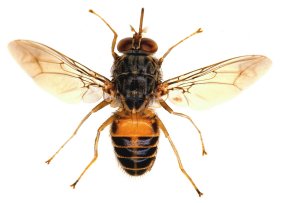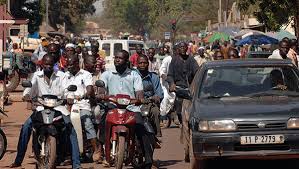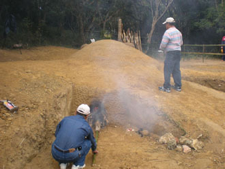
非洲大陸地圖
前言 (01/16/2015)
瑞循學長在2013年九月請人把他先前的文章「非洲印象記」翻成英文,經他同意,我謹在此把英譯部分加附到2010年二月發佈的部落格文章上。不是很多人有這種寶貴的非洲經驗,瑞循學長觀察精闢,文筆又好,我們很有福氣也很感謝瑞循學長的分享 。
前言 (02/20/2010)
學長瑞循帶著家人到非洲生活、經商多年,他對非洲有近距離、第一手深入的觀察。以下文章就是他從商業、人道及環保的觀點,以生動的文筆娓娓道來他的非洲印象。
非洲對我們台灣民眾而言,它是個遙遠的古老大陸塊,以前有台灣農耕隊到非洲友邦進行農業技術外交,Discovery 及國家地理頻道常常報導很多非洲(如賽倫蓋地Serengeti 國家公園)令人嘆為觀止、屏息觀賞的野生動物大遷徙,多個非洲國家長期內亂,民不聊生,時有餓死人的情況(所以我們才有每年”飢餓30”的活動”)等等。
2007年十一月我到東非國家坦桑尼亞爬吉利馬紮羅山(Mt. Kilimanjaro)時,有了一些非洲印象(遊記收在文章分類:國外旅遊記事)。當地人民看來樂天知命,快樂指數不見得比我們低。很高興在此刊載瑞循學長的”非洲印象記”,分享大家。
非洲印象記
My Impressions of Africa
By 黃瑞循 Ruey-Shiun Huang
Translated into English by Anthony W. Sariti
一般台灣人心目中的非洲,就是三個詞:「黑人」、「野生動物」、「窮困落後的熱帶地方」。如果你也是這樣想的話,你想的並不是整個非洲,大概只是剛果或辛巴威或肯亞或南非北部的一個大草原及散布其中的村落。西非象牙海岸、奈及利亞與賴比瑞亞等地已沒有大批成群的野生動物;北非氣候宜人,不但沒有大批成群野生動物,而且都是阿拉伯人,南非南端很冷,這都與一般人所想的不同。
In the mind of the average Taiwanese, “Africa” means three things: “black men,” “wild animals,” and “a poor, backward tropical place.” If this is also what you think, it doesn’t at all apply to the whole of Africa, maybe just the Congo, Zimbabwe, Kenya or the grasslands and scattered villages in the northern part of South Africa. In West Africa’s Ivory Coast, Nigeria and Liberia there are no longer any large groups of wild animals. The climate of North Africa is pleasant, and not only are there no large groups of wild animals there, the people are all Arabs. The tip of South Africa is quite cold. This all runs contrary to what the average person thinks.
我個人從一九七八年到一九八五年住在西非的象牙海岸首都阿必尚,其間也常到鄰近國家如迦納、多哥、奈及利亞、上伏塔(現在稱為「布基納法索」,仍為台灣邦交國)、喀麥隆、加彭、塞內加爾、以及北非的摩洛哥、埃及等國家做業務旅行,對非洲有近距離的觀察。因為身在非洲多年,對非洲的資訊也比較注意,所以,雖然活動的地方大都在法語西非洲與英語的奈及利亞,但我個人的印象、感情與了解,包含了整個非洲,尤其是撒哈拉沙漠以南的黑人非洲。

象牙海岸首都阿比尚(Abidjan, Ivory Coast) 海岸景觀
An oceanfront view of the capital of the Ivory Coast, Abidjan.
From 1978 to 1985 I lived in the capital of the Ivory Coast, Abidjan. During that period I also made business trips to neighboring countries, such as Ghana, Nigeria, Upper Volta (now Burkina Faso, which continues to have diplomatic relations with Taiwan), Cameroon, Gabon, Senegal, as well as Morocco and Egypt in North Africa, and had the opportunity for upclose observation. Because I have spent a lot of years in Africa, I pay more attention to news from there so, although most of the places I am personally familiar with are the francophone countries of West Africa and English-speaking Nigeria, my own personal impressions, feelings and understanding cover all of Africa, especially sub-Sarah ran Black Africa.
許多人看到黑人,腦筋立刻浮起恐懼與防備,似乎黑人就是犯罪的代名詞,這是受到美國好萊塢電影的影響,黑人總是出現在反派的角色。而且,在漢字詞彙「黑」往往與負面意思連在一起,例如「黑道」、「黑幫」、「黑槍」、「黑社會」、甚至「又黑又醜」(沒有人講「又白又醜」,反而說「一白遮三醜」)等等。其實,這種先入為主的觀念大錯特錯,總體而言,黑人是一個非常和平、樂天的種族,也因為和平樂天,黑人在音樂、舞蹈、體育、藝術等等方面都非常出色,非洲黑人如此,源自非洲的美國黑人自然也如此。至於一般印象中黑人犯罪率較高,那是在資本主義社會貧富不均造成的社會問題,而不是種族問題。
黑人與大自然及野生動物和諧共存了幾千年,直到白人來到非洲之後才破壞了和諧,也難怪大自然會反撲。在二十一世紀初期世界金融海嘯、資本主義經濟制度遭受很大考驗,讓有識之士了解到人類與大自然環境共存的重要之時,黑人原住民與週遭環境共享資源的生活,衣食無缺、樂天知命,快樂而有節奏的音樂與舞蹈,生活內容豐富。這種文化,從生活哲學角度來看,未必比白人「搶奪自然資源、圖利自己」的文化落後與窮困。
When many people see Black people they immediately become fearful and defensive, as if “Black people” is a synonym for “criminals.” This is the influence of Hollywood films, in which Black people invariably appear in negative roles. Furthermore, in Chinese the word “black” frequently connotes something negative. For example, we have words like “underworld” (“black road”), “gangsters” (“black gang”), “illegal guns” (“black guns”), “crime syndicate” (“black society), and even phrases like “black and ugly” (no one says “white and ugly,” rather “one part white [i.e., skin] covers three parts ugly”), etc. In fact, these first, prejudicial impressions are totally and absolutely wrong. Seen as a whole, Black people are extremely peaceful and upbeat, and as a result they particularly distinguish themselves in the fields of music, dance, athletics, and art. This is true for Black Africans and, of course, also for Black African-Americans in the U.S., who came from Africa. As for the general impression that the crime rate among Blacks is high, this is a social problem caused by the disparity between rich and poor in a capitalist society. Black people have lived thousands of years in harmony with nature and wild animals, and it was only after white people arrived in Africa that this harmony was destroyed—it is no wonder that nature would push back. The world financial tsunami of the early 21st century and the ensuing huge test this represented for the capitalist economic system made knowledgeable people realizehow important coexistence with nature is for humanity. The life of Black indigenous peoples who share the resources of their surrounding environment are provided with food and clothing, are upbeat and content with their life, they are happy and express themselves in rhythmic song and dance, their lives are full and rich. Such a culture, seen as a philosophy of living, is not necessarily backward or impoverished in comparison with the culture of white people, a culture that “plunders natural resources and just focuses on self-benefit.”
幾千年以來,非洲黑人原住民採取與原生動植物「共享自然資源」的經濟制度;白人的資本主義經濟制度則以「自利動機」為理論基礎,造成無論對自然資源或平民勞動力無情掠奪,近年已證明這是地球暖化、經濟與社會動亂的罪魁禍首。現在所謂的「弱勢者」其實只是「被掠奪者」而已。最近有人推動企業社會責任,要掠奪者把奪取的財富,償還一部份給被掠奪者,還被稱讚為「慈善家」、為社會做「公益」,這不是很諷刺嗎?
For several thousand years Black Africans have adopted an economic system rooted in the principle of “sharing natural resources” with the indigenous animals and plants. The capitalist economic system of white Europeans has its theoretical basis in “self-interest” and ruthless exploitation, whether it’s in relation to natural resources or a civilian labor force. Recent years have proved that this is the chief culprit behind global warming and economic and social turmoil. What is now called the “disadvantaged” are really nothing more than the “exploited.” Very recently some people have promoted the idea of “corporate social responsibility,” wanting the exploiters to pay back some of the wealth they have plundered to the very people they plundered it from—and they are praised as “philanthropists” and for performing a “public service” for society in the bargain. How ironic is this!
整個非洲大陸的面積為 30,065,000 平方公里,僅次於亞洲大陸,比中國大陸大得多,所以,現在的非洲人並不等於黑人,撒哈拉沙漠以北的北非,大都是阿拉伯人。撒哈拉沙漠以南才是黑人世界,但南非有許多白人。氣候方面,北非地中海沿岸是地中海型氣候,乾爽宜人;南非的好望角已接近南極,很冷,只有在赤道橫過的非洲腰部,才是乾季與雨季交替的炎熱天氣。

馬賽婦女(Masai women)
The skin color of Black Africans varies considerably. In Senegal it is jet-black, like ink, while in the Ivory Coast, Kenya, and Ethiopia it is mostly deep brown. Africa is so big that there are many differences among the Black people who live there. Some are short and some tall and lanky. In Nigeria alone there are three major groups of people: the Hausa in the north, the Igbo in the southeast, and the Yoruba in the southwest. There are also many small tribes scattered among them. Generally speaking, the Hausa are slim and tall with long legs, the Yoruba think being fat is beautiful, while the Igbo are the most educated (by white Europeans) and resemble Japanese in their refinement. In language, culture, religion and even appearance they are all different.
黑人的共通點,除了膚色是深褐或黑的以外,頭髮是扁的,容易捲曲。黃種人的頭髮切面是圓的,如果頭髮掉在地上,是一條直直的躺在地上;黑人的頭髮掉在地上,是一個一個的小圈圈。所以女性黑人從小就要把頭髮用髮線一簇一簇的纏起來,讓它直起來。
Aside from their deep brown or black skin color, Black Africans share flat, most likely curly hair. Asian hair is round, and if the hair falls on the ground it will lie straight. If Black hair falls on the ground, it will curl up in small circles. For this reason Black women use hair bands to twist their hair up in bunches from childhood so the hair will straighten out.
有的漫畫上的黑人,白牙齒、厚嘴唇,似乎不合西方世界美的標準,當然,美的標準各地不同,各時代也不同,黑人是有許多地方的人跟大唐帝國時代的人一樣,以胖(豐滿)為美。黑人牙齒白,也許是皮膚黑的襯托,也可能是非洲黑人常折一種特別的樹枝當牙刷,以樹汁當成潔牙劑,相當環保。並不是所有黑人都是厚嘴唇。印象中,衣索比亞的女人五官端正、胸挺、腳長、屁股翹,絕對是現代西方美女的標準。據說古代亞歷山大東征,大軍打到衣索比亞,就被當地美女迷住,不再往東去打印度了。
Some caricatures show Blacks with white teeth and thick lips, seemingly not in line with Western standards of beauty. Of course, beauty standards are different all over and at various times in history. There are many places Black people live where, just as during the time of the Tang Empire, fatness (fullness) is taken as a standard of beauty. Black people’s teeth appear white perhaps because they form such a contrast with their dark skin, maybe also because Black Africans often bend a twig from of a particular tree and use it as a toothbrush, using the sap of the tree as toothpaste—a very environmental approach. And it is certainly not the case that all Blacks have thick lips. My impression is that Ethiopian women have very regular features, ample breasts, long legs, well-formed buttocks, every bit in line with current standards of beauty for women in the West. It has been said that on Alexander the Great’s campaign in the East, his army reached Ethiopia, were smitten by the local beauties and so did not march further east into India.


現代衣索比亞的美女
Modern Ethiopian girls-- fit and beautiful

衣索比亞部落美女,紋身、戴唇器。
黑人的皮膚質地(texture)是世界上最好的,細膩的程度讓許多西方白人女性艷羨。以皮膚的細嫩程度來說,黑人第一,西方白人最差,亞洲黃種人介於其中。即使是一個中年男性黑人,摸摸他的手臂,仍然像嬰兒一樣細嫩。法國人最喜歡黑人,常常可看到黑人先生和法國白人太太,或者是法國白人先生和他的黑人太太,大概法國人比較重視皮膚的接觸吧。最妙的是,這種黑白混血的後代,絕對繼承了父母優良的遺傳基因,皮膚細嫩,而色澤是咖啡加牛奶(法文Café au Lait)的顏色,非常漂亮。
The texture of Black skin is the best in the world, its smoothness and softness is the envy of many Western white women. In these terms, Black skin is No. 1, while white skin is the worst. Asian skin is somewhere in between. Even the skin on the back of a hand of a middle-aged Black man is as smooth and soft as that of a baby. The French are especially fond of Africans. You often see an African man with his white wife, or conversely, it will be a French white man with his Black wife. This is probably because the French pay great attention to the feel of skin. Especially intriguing is that the progeny of these black/white mixtures certainly inherit and carry on the best genes of both parents. Their skin is smooth and soft and the color of café au lait, extremely beautiful.
比起黑人與亞洲人,白人的皮膚質地差也不是沒有好處,這讓他們發展了全世界最先進的化妝品業,不但讓他們的婦女皮膚細嫩起來,也讓他們賺了很多黑人與亞洲人婦女的錢。
The texture of White skin does not compare with that of Black or Asian skin, yet this is not all bad, for it has made possible the development of the most advanced cosmetic industry in the world. Not only have cosmetic companies been responsible for giving the skin of Western women a smoother and softer feel, they have also earned a great deal of money from Black and Asian women who also buy their products.
非洲最早期是受到阿拉伯人的侵入,現在撒哈拉沙漠以北、地中海沿岸的好山好水都成了阿拉伯人的世界。十八世紀以後,歐洲白人紛紛入侵黑人非洲,沒有「免疫力」的非洲黑人就像被外太空來的細菌侵蝕一樣,毫無招架能力,結果歐洲白人把非洲整個瓜分了。而列強佔據的地盤與黑人各族的居住地並不一致,因此,常有共同語言種族的黑人被分成好幾個國家、操不同官方語言。西班牙人進入摩洛哥,佔據康納利群島,英國人佔據東非和南非,法國人佔據西非和中非。所以,現在非洲人的官方語言,大致來說,北非是阿拉伯語世界,東非與南非是英語世界,西非與中非除賴比瑞亞、迦納、奈及利亞、喀麥隆的一部分是英語世界之外,都是法語世界。康納利群島講西班牙語;賴比瑞亞是講美式英語,他們是美國解放黑奴後回到非洲的黑人後裔。
Very early on Africa was invaded by the Arabs. The ideal landscape of present-day Africa north of the Sahara and the Mediterranean coast became the Arab world. When the white Europeans invaded Africa in profusion in the 18th century, the African Blacks had no “immunity” to the diseases they brought and it was as if they were being wasted away by germs from outer space. They had absolutely no ability to withstand the onslaught. As a result, the white Europeans carved up the whole of Africa like a melon. The different areas occupied by the big powers did not necessarily coincide with those where individual tribes actually lived, thus it was often the case that tribes speaking the same language were split among different countries speaking different official languages. The Spanish entered Morocco and occupied the Canary Islands, Great Britain occupied East and South Africa, and the French occupied West and Central Africa. Thus, broadly speaking, the official languages currently spoken in Africa are Arabic in the north, English in east and South Africa, and in West and Central Africa (except for Liberia, Ghana, Nigeria, and a part of Cameroon that are English-speaking) the official language is French. Spanish is spoken in the Canary Islands, and American English is spoken in Liberia by descendants of American slaves who returned to Africa after they were freed.
黑人非洲的物產礦產很多,但這些物產礦產卻沒有為這些黑人老百姓帶來幸福快樂的生活,在白人的壓榨之下,「懷璧其罪」、讓黑人平民以及非洲的礦產、野生動植物命運都很慘。獅子山國的「血鑚石」已拍成電影。犀牛因為牠的角、大象因為牠的牙、花豹因為牠的皮、森林因為它的木材、甚至黑人本身因為他的勞力被抓去當奴隸,在貪婪的白人操控之下,命運都很慘。
Black Africa has produced a great deal of agricultural and mineral wealth but this has not brought the Black population a happy life. The fate of the average Black African, as well as the continent’s mineral wealth, its wild animals, and its agricultural resources has been pitiful—all because they are “guilty of having something valuable.” A movie has even been made about the “blood diamonds” of Sierra Leone. The Rhinoceros, because of its horns, the elephant, because of its tusks, the leopard, because of its skin, the forests, because of their wood, even Black Africans because of their labor have been enslaved—all these, controlled and manipulated by greedy white people, have suffered a pitiful fate.

非洲的森林被大量砍伐,黑人非洲的森林爛伐(deforestation)十年間平均消失約 80% 的森林,最嚴重地區甚至有 90% 森林面積消失。德國的黑森林,挪威的海岸森林,甚至英國、法國的森林都保護得好好的,他們卻到非洲去搶木材。我親眼看到巨大高聳的原木被伐木機械拖出來,在製材場簡單加工製成木料,一船一船的運到歐洲,出口所得只是好了那些學習白人政治制度的黑人政府高官,黑人百姓從「出賣家產」中獲益多少?無人過問。
A great percentage of the African forest has been cut down, and within ten years deforestation has led to an average 80% loss of forested areas—in the worst-affected locations as much as 90% of the forested area has been lost. Germany’s Schwartzwald, Norway’s shoreline forests, even the forests of Great Britain and France are very well protected, yet those countries go to Africa to plunder timber. I have seen with my own eyes towering trees cut down by machines and the logs pulled out for simple processing at a lumber mill and then put on one boat after another headed for Europe. The income from this export only benefits high-level officials of those Black governments that have learned the white political structure—and how much benefit goes to the Black population from the “selling of the family property?” No one bothers to ask.

非洲原始森林大量被砍伐,製成木材運往歐洲
The African old-growth forests have been largely cut down for lumber to be shipped to Europe.
非洲黑人的頭目、酋長或是到歐洲留學歸來的「黑人權貴子弟」,好的沒學到,學到的是白人爭權奪利的精髓,不但沒有給他們的平民百姓帶來幸福,反而因為爭權奪利,有時甚至血流成河,要注意的是:死的都是平民百姓。
Black African leaders, tribal chiefs or the “children of Black bigwigs” who have returned from study in Europe have not learned anything good. What they have learned is the quintessence of the white man’s fight for power and wealth. Not only have they failed to bring happiness to the common people, just the opposite, for this fight has often led to wholesale slaughter. And one thing that needs to be pointed out: it is the common people who do the dying.
奈及利亞是黑人非洲石油產量最豐富的國家,有人說其國家預算是以產油量乘以原油價格來算。石油產地在奈及利亞東南與海岸一帶,正好是伊波族人居多的地方。因為種族、宗教甚至石油利益的衝突,發生內戰(1967 – 1970),伊波族人成立比亞弗拉共和國(Republic of Biafra),戰爭帶來的死傷慘重,許多都是無辜的平民與餓死的兒童。一九七零年內戰結束,比亞弗拉共和國被摧毀。七年後,一九七七年我第一次進入伊波族人內陸重要交易城市阿巴(Aba),馬路上一個一個的砲彈坑成為積水的爛泥垃圾坑,根本不能行車,我的客戶只好用機車載我在凹凸不平的路邊走。城市裡到處都可看到吃腐屍的禿鷹,野有餓殍的場景,使我非常震撼,久久不能磨滅。

1970年代Biafra從Nigeria獨立出來而兩國交戰,Biafra
人民招殃。上圖為Biagra當時餓得皮包骨的母子。Biafra 戰爭
造成約一百萬人死傷。In the 1970s Biafra declared independent from Nigeria and the two countries fought a civil war, the Biafrans bringing disaster upon themselves. This photo is of a starving mother and child, just skin and bones. The Biafran war caused some one million deaths and casualties.
阿巴是奈及利亞的走私大本營,吸引了許多台商、香港商、甚至美商去冒險賺錢。上世紀的七零年代,日本東麗紡織在奈及利亞設廠生產,奈及利亞因此禁止成品布進口,奈及利亞商人則用假報單,賄賂海關官員,大批進口成品布,最盛時據說在東部的「哈可港」(Port Harcourt)每月有兩百個貨櫃的五金日用品等貨物進口,其實大都是禁止進口的成品布。奈及利亞也是許多假信用狀與專們騙取世界各地的樣品來販售的源頭,還有林林總總的商業詐術讓許多貪財大意的外國人上當,這些商業詐術,絕對可以寫成一本厚厚的「騙術大全」。
Aba is the HDQ for smuggling in Nigeria and attracts many Taiwan, Hong Kong and even U.S. businessmen who take risks to make money. In the 1970s the Japanese Toray Industries (textiles) set up production in Nigeria and as a result Nigeria prohibited the import of finished cloth. Nigerian businessmen then used false customs declarations, bribed custom officials, and proceeded to import finished cloth. It is said that in the heyday of this activity there were two hundred containers of hardware and daily necessities imported every month at the eastern port of Port Harcourt. In fact, most of these containers were filled with prohibited finished cloth. Nigeria is also the source of many fraudulent letters of credit and illicitly obtained product samples from throughout fall victim to. One could certainly write a very thick “Compendium of Scams” on these fraudulent business practices.

Port Harcourt 街景
我常跑奈及利亞時,幾乎每次旅行都會到東部去。Port Harcourt 有機場,每天都有許多航次班機來回首都「拉哥斯」(Lagos),台商或港商來往很多,往往飛機剛下降,上機的乘客就衝向飛機,爭先空後的想擠上飛機,因為你上飛機後有可能因沒有座位而被趕下來。Check-in 之後還是沒座位?原來機場工作人員在販售 Boarding Pass 登機證,懂得門路的台商或港商就不排隊 check-in,花一些錢買張 Boarding Pass 然後就準備衝向飛機,如有座號重複,先坐先贏。
When I used to visit Nigeria I almost always traveled to the east coast. Port Harcourt has an airport with numerous daily flights to and from the capital, Lagos. Many Taiwan and Hong Kong businessmen pass through here and frequently, as soon as a plane lands, passengers all make a made dash to squeeze onto the aircraft because after you board the plane there may be no seat for you and you will be thrown off. No seats after check-in? In fact airport workers sell boarding passes. Taiwan and Hong Kong businessmen who know the ropes do not stand in the check-in line. They spend a little money to buy a boarding pass and then get prepared to rush the plane. If there are duplicate seat numbers—well, first come first served.
象牙海岸在商業方面就比較規範,但台商在象牙海岸也不是沒有「福利」,最大的「福利」就是打國際電話。象牙海岸國際電話局的接線生常會跟熟識的台商兜生意,當時都是人工接線,接通一通打回台灣的國際電話,沒有時間限制、隨便你講個痛快,第二天接線生會來收錢,3,000 西非法郎一通,以當時匯率計算,約六到十五元美金,這個大概是 Skype 發明以前全世界最便宜的電話費。
Doing business in the Ivory Coast was more normal, but Taiwan businessmen there were still not without “benefits,” the biggest of which was making international phone calls. The Ivorian International Telephone Exchange operators often could drum up business with Taiwan businessmen they knew. When I was there, operators were still physically making the connection at a switchboard. An international call back to Taiwan had no time limits, you could talk to your heart’s delight. The next day the operator would come and collect the charge—3,000 West African francs a call. This amounted to some $6~$15 US dollars a call at the then-current exchange rates. This was perhaps the cheapest international telephone rate in the world prior to Skype.
以西方文明的標準來講,黑人非洲衛生條件確是落後很多,在電視裡播出的 National Geography 或 Discovery 頻道的兇猛的獅子,被許多蒼蠅爬滿臉,顯得毫無辦法。非洲蠅種類很多,繁殖力強,是非洲黑人與動物的最大禍害,比兇猛的獅子還可怕。有一種叫做「采采蠅」(Tsetse Fly)帶來的昏睡症曾造成大量黑人的死亡。


這就是惱人的Tsetse Fly, 吸人血在皮膚下蛋
Above is the Tsetse Fly drawing blood from a person and laying its eggs.
By Western standards of civilization, sanitary conditions in Black Africa do, in fact, lag far behind. On the National Geography and Discovery TV channels you can see ferocious lions whose faces are covered with flies, helpless to do anything about it. There are many kinds of flies in Africa, and they reproduce prodigiously. They are the scourge of both man and animal in Africa, more to be feared than the ferocious lions. There is one, the Tsetse Fly that carries sleeping sickness, which has killed a great many Africans.
我們全家剛到非洲不久,女兒進入法國學校幼稚園。有一天,我發現她的腿上有約一公分大的紅腫,到學校時跟老師說,請老師注意,老師一看,立刻拿了消毒水,並用一根針把紅腫部分挑開,一隻活生生白色的蛆就這樣掉下來,還一直蠕動,我用棉花把這活生生的蛆帶回家給太太看,我們兩人都嚇得發抖。原來這是果蠅的幼蟲,我們把洗好的衣服曬到在外面陽台上,果蠅在衣服上下蛋,我們穿上衣服,果蠅但就在皮膚孵化,鑚到皮膚內成長,如果這果蠅在眼睛裡孵化,眼睛一定瞎掉,非洲很多盲人就是這樣引起的。從此,我們把曬乾的衣服收下之後,一定要用熨斗每一件都燙過,然後,還在陽台外面架上紗窗。
Not long after my family and I arrived in Africa, my daughter entered a French kindergarten. One day I discovered that her leg had a red bump on it about a centimeter big. When I took her to school I asked the teacher to watch out for it. As soon as the teacher saw it, she immediately took some disinfectant and used a needle to pry it open. A living, white maggot fell out and started wriggling around. I wrapped up the maggot in some cotton and took it home to show my wife. We were both frightened out of our wits. This was, in fact, the larva of a fruit bat fly. When we had hung our washed clothes out on the balcony to dry, the fruit bat fly had laid its eggs on the clothes. When we put on our clothes the fruit bat fly hatched on our skin and burrowed under it to mature. If this fly had hatched in our eyes, we would certainly have gone blind. This is how many blind Africans acquire this disability. From then on, after we dried our clothing, we would always use a hot iron to press them out killing the larvae; and we also put up screens around our balcony.
紗窗也許可以防果蠅,卻無法防止一種更小更細、無孔不入的「沙」,這是每年從撒哈拉沙漠吹來的「沙塵暴」。住在台灣的人一看到這「暴」字,想到的是「狂風暴雨」,非洲有時候也有狂風暴雨,但這沙塵暴卻像霧一樣靜悄悄的拜訪你,不知不覺的侵占了你所有的地盤,家具、衣服、床鋪,無處不是細如牛毛尖的沙,當然也會沾上你的皮膚、臉孔,甚至侵入你的呼吸道。如果你看過日本作家安部公房的「砂丘之女」,你就可知道無處不在的沙,有多厲害了。

Sahara sandstorm 撒哈拉沙漠沙塵暴
Screens can, perhaps, guard against fruit bat flies but are unable to keep out the sand from the Sahara Desert sand storms, the grains of which are smaller and finer than the flies and find their way through any crevice that might exist. When people living in Taiwan hear the word “storm” they immediately think of a “wind and rain storm.” Rain storms do sometimes occur in Africa, but sand storms are like a fog that very quietly sneaks up on you. Without your being aware, the sand invades and envelops your space. Furniture, clothing, beds—everything becomes covered with a very thin layer. Naturally, it gets on your skin, face, and even into your respiratory tract. If you have seen Kobo Abe’s film The Woman in the Dunes, you know just how terrible such sand can be.
西非洲有許多國家受到台灣農耕隊的協助,對台灣印象都很好,象牙海岸是西非大國中最後跟台灣斷絕外交關係的,即使已斷交,象牙海岸農業部因為有台灣農業技師劉春雄在上班,仍然在農業大樓外的旗桿上高掛青天白日滿地紅的旗幟,可見台灣農業技術對他們多重要。
Many African countries have received assistance from Taiwan agricultural teams and have a good impression of Taiwan. The Ivory Coast was the last major West African country to break diplomatic ties with Taiwan. Nevertheless, because Taiwan agricultural technician Liu Chun-Hsiung works in the Ivorian Ministry of Agriculture, the Taiwan flag still flies on the flagpole outside the Ministry building, making it obvious just how important Taiwan agricultural technology still is to Ivoirians.
農耕隊協助他們種植的稻田綠油油一片,稻穀要成熟時,必須在稻田上佈滿一片網子,否則這些穀子會被成群的麻雀一下子吃光,在台灣無法想像麻雀成群結隊飛來的樣子,遠看就像一堆烏雲低空飛來,所以預防「鳥害」非常重要。這些麻雀也會成群在一棵樹上結巢,技術非常好,密密麻麻的,整棵樹都是鳥巢,像是果實累累一樣。
A paddy field planted with the assistance of an agricultural team is a patch of shimmering green but when the stalks mature they will have to spread a large net over the field, otherwise the rice plants would be picked clean by sparrows in one fell swoop. In Taiwan it’s impossible to imagine this swarming of sparrows. From a distance they look like a black cloud drifting close to the ground. Preventing “bird damage” is thus extremely important. These sparrows also nest as a group in a tree. Their technique is impressive as the entire tree is dotted with their nests, looking like clusters of fruit.

成群麻雀築巢樹枝上,像結滿果實
Flocks of sparrows build their nests in a tree, looking like clusters of fruit.
一九八一年,我到象牙海岸北邊鄰國也是法語國家的上伏塔(Haute Volta, 英文稱為 Upper Volta)首都「瓦嘎杜古」(Ouagadougou)。這個城市位在撒哈拉沙漠南緣,雨量很少,年降雨量只有 890毫米,而且集中於五到九月,讓我領略的乾燥之國不同的場景,水當然很重要,可以看見台灣農耕隊為灌溉需要建造的水庫。這個國家年平均溫度 26 到 28℃,太陽直曬,很熱,但樹蔭或屋蔭下,其實算涼快,因為沒有溼氣在導熱的緣故。小動物如果死在野外,不會腐爛,會被太陽晒乾成像木乃伊一樣。
In 1981 I visited Ouagadougou, the capital of Upper Volta, the Ivory Coast’s northern neighbor, also a francophone country. Ouagadougou is located on the southern edge of the Sahara Desert. It gets very little rainfall, with a yearly average of only 890 millimeters and a “rainy season” that goes from May to September, which gave me an appreciation of the different circumstances really dry countries have to deal with. Water, naturally, is extremely important and here I was able to see a reservoir built by a Taiwan agricultural team to meet irrigation needs. The yearly temperature in Upper Volta averages between 26°C~28°C, the sun’s rays are direct and it is very hot. However, in the shade of a tree or a house, it actually feels cool because the air has no moisture to transmit the heat. If a small animal dies in the field, it will not decompose but will be desiccated by the sun and look just like a mummy.
我從首都「瓦嘎杜古」搭火車南下要回象牙海岸首都阿必尚,上伏塔境內沿途乾黃的泥土平原上可以看到一堆一堆的圓形草頂的土屋,大都是中間一大屋、兩旁是一到四小屋圍繞,起先是稀稀疏疏的,越靠近南部大城「博博丟拉索」(Bobo-Dioulasso)就越密集,原來這是上伏塔人的住家,大屋是男主人的,旁邊有幾個小屋,就表示他有幾個太太。上伏塔百姓大都是虔誠的伊斯蘭教徒,伊斯蘭教容許最多有四個太太,但必須對所有的太太都平等對待;比起中國的三妻四妾,有時還會拋棄糟糠之妻,的確文明得多。美國發動的「反恐戰爭」給伊斯蘭教徒有許多負面的資訊。其實,我在西非遇到的許多黑人伊斯蘭教徒的正直與誠實,令人刮目相看。
I took a train from Ouagadougou back to Abidjan and along the way in Upper Volta I saw groups of mud buildings with conical grass roofs on the dried mudflats that stretched out before me. Most had a large building in the center and from one to four smaller buildings on either side surrounding it. At first they were few and far between but the closer we got to the major city of Bobo-Dioulasso in the south the more numerous they became. These houses were Upper Volta residences. The big houses belonged to the “master,” the small houses next to it meant the master had several wives. Most Upper Volta inhabitants are devout Muslims and the Islamic religion allows a maximum of four wives, but the husband must treat them all equally. Compared with the Chinese “three wives and four concubines” tradition, in which sometimes a wife who has shared her husband’s hard times can be cast out, this system is decidedly much more civilized. In launching its “War against Terror” the U.S. has given out a lot of negative information about Muslims. In fact, the many upright and honest Black Muslims I met in West Africa have made me look at Muslims in a different light.

布基納法索的村莊
A village in Burkina Faso
上伏塔在一九八四年改國名為「布基納法索」(Burkina Faso 是當地原住民的語言,意為「君子之國」),台灣農耕隊在那裡深耕多年,現在還是與台灣有大使級外交關係。
In 1984 Upper Volta changed its name to Burkina Faso (in the local indigenous languages burkina faso means “land of upright people”). Taiwan agricultural teams have worked there for years and Taiwan continues to have an ambassador-level diplomatic relationship with the country.

Typical street scene(街景) in Ouagadougou, Burkina Faso
我在象牙海岸時期,法語西非地區共同使用的貨幣是西非法郎,正式名稱為「非洲金融共同體法郎」Francs CFA(Communauté Financière d’Afrique),當時西非法郎固定以一個法國法郎換成五十個西非法郎的匯率換算,到一九九零年代西非法郎大貶值,成為一個法國法郎換一百個西非法郎。提這個貨幣的原因是當時西非法郎有一種紙幣上有一幅農人在旱地上耕種的畫面,黑人農夫拿著短柄鋤頭低頭努力的耕地。漢人耕種的鋤頭,鋤柄有到成人肩膀這麼高,鋤地時,身體不必彎腰灣太低;但黑人的短柄鋤頭,鋤柄幾乎只高到成人腰部,因此,黑人鋤地時,必須彎腰彎很低,幾乎與腳成直角,雙手力道才會大。

非洲農夫的短柄鋤頭
The African farmer’s short-handled hoe.
有這麼一說:白人為了管理黑人在農場的勞動,刻意把鋤柄截短。短鋤柄使黑人必須彎腰低頭工作,這樣騎馬的白人在廣大的農場可以很清楚的看到哪一個人站起來休息,就可快馬加鞭的拿皮鞭揮打過去。幾百年過去,短鋤柄與深彎腰變成理所當然了。這與印度哲學家講學要綁一隻貓在旁邊一樣,非洲黑人已忘記被奴役的歷史,以為這是勤勞工作的象徵而印到紙鈔上了。
Some people say that in order to manage the Africans working on a farm, the whites purposefully made the hoe handle short. The short handle forced the Africans to bend over and lower their heads when they worked. This way the white overseers riding on horseback could clearly survey the broad fields and clearly see anyone who was standing up and taking a rest, enabling the overseer to ride over at top speed and take the whip to him. After a couple hundred years the short-handled hoe and the deep bending over became a matter of course. This was just like the Indian philosopher who would tie up a cat at the side of the room when he lectured. Black Africans have forgotten the history of their enslavement and think this just symbolizes diligence and hard work...and so they put an image of it on their currency.
網路上流傳一個故事:古印度有一位大哲學家非常喜愛他養的貓,每次講學,貓都會跟著去。但這隻貓在哲學家講課時,會在學生堆裡走來走去,擾亂學生聽講,這位大哲學家沒辦法,講學時只好把愛貓綁在一旁。這偶然的行為,久而久之,居然變成必然,甚至他過世多年後,他的學生或學生的學生也成為哲學家,講課時,都會抓一隻貓綁在旁邊,以為這是智慧的泉源。這跟非洲黑人使用短柄鋤深彎腰工作,以為是代表勤勞努力一樣,這種「必然」卻沒人想到也許出自某人有心或無心的「偶然」。
There is a story on the Internet that goes as follows: In ancient India there was a great philosopher who was extremely fond of his cat. Each time the philosopher would lecture, the cat was bound to go with him. But when the philosopher was lecturing, the cat would go among the students, interfering with their listening to the lecture. The philosopher had no choice but to tie up his beloved cat to the side of the room when he spoke. After a while, this chance behavior became inevitable. Even many years after he died, as the philosophers’ students or his students’ students themselves became philosophers and gave their own lectures, they would also tie up a cat to the side of the room thinking this act was a source of wisdom. This is just like Black Africans who use a short-handled hoe and bend down deeply to do their farm work…they think this represents diligent, hard work. No one ever thought this “inevitability” might come from an intentional or unintentional “chance occurrence.”
世界上有多少事,都是把「偶然」視為「必然」?女人的項鍊手鐲,很有可能是遠古時代少女被搶親時綑綁的草藤,後來女人卻心甘情願的戴上。印度如此,非洲如此,號稱先進高科技時代的我們,還不是如此?我現在看到美女脖子上帶著項鍊、手腕上帶著手鐲或花圈,常會偷偷的會心一笑,無論什麼材質、如何美化,這些還是男人綑綁女人的工具,而美女們竟然還互相炫耀。
How many things in the world are seen as “inevitable” that are really “by chance”? Women’s necklaces and bracelets may very well be modern versions of the tufted vetch used to tie up young girls when they were kidnapped for marriage in very ancient times. Later, women were happy and willing to put them. So it is in India, in Africa—and is it not so with us who call ourselves people of the advanced, high-tech age? When I see a beautiful woman with a necklace around her neck, a bracelet or flower wreath around her wrist, I often secretly smile to myself. No mater the quality or how beautiful, these are still the tools men use to “tie up” women, who in fact still show off to one another.
一九七八年我第一次踏入象牙海岸鄉下村莊時,發現非洲黑人燒木炭的方法與我在台灣鄉下所看到台灣人燒木炭的方法一模一樣,讓我非常驚異,象牙海岸與台灣相距這麼遠,到底是台灣傳過來象牙海岸?還是象牙海岸黑人傳過去台灣?非洲黑人家裡也養狗,而不是養獅子,跟白人、阿拉伯人、印度人、漢人、滿人、蒙古人一樣,人類發展殊途同歸呢?還是即使在遠古時代,大家就已開始互相交流?
In 1978 when I first set foot in an Ivorian village, I discovered that Africans made charcoal exactly as I had seen it done in the Taiwan rural areas. I was stunned. The Ivory Coast and Taiwan were so far distance from each other, had Taiwan actually brought this technique to the Ivory Coast? Or had Ivoirians brought the technique to Taiwan? Africans also raise dogs in their homes, not lions. They are just like white people, Arabs, Indians, Chinese, Manchurians, and Mongolians. Does the course of human development run in the same channel? Or is it that even in remote antiquity contact between peoples had already begun?

象牙海岸鄉下燒木炭方法幾乎跟台灣一模一樣。
Making charcoal in the Ivory Coast rural areas is done almost exactly as it is in Taiwan.
在非洲生活這麼多年,會讓人仔細思考:非洲黑人與號稱五千年文明的漢人、工業革命後靠科技與資本主義發財的歐洲人與美洲人、發動世界大戰的日本人與德國人、其實都是一樣,生而平等,在不同機緣下,各自努力,在「偶然」與「必然」之間流轉。十七世紀以前,黑人非洲北有撒哈拉沙漠、東、西、南是大海,遠離紛擾世界,加上生活資源豐富,原住民和善,衣、食、住取得容易,用音樂、舞蹈、藝術來享受生活,成為難得的樂園;「偶然」的,白人來了,一切都改變了,這個樂園也就永久失去了。
Living so long in Africa can lead one to some deep thinking: Black Africans and Chinese who claim five thousand years of civilization, Europeans and Americans who have become wealthy through technology and capitalism following the industrial revolution, Japan and Germany who launched WWII—they are all really all the same. They were born equal and each toiled hard, each had different chances, each shuttled between “chance” and “inevitability.” Before the 17th century Black Africa was far from the turmoil of the rest of the world separated as it was by the Sahara Desert in the north and the ocean in the east, west, and south. To this can be added the abundance of resources for daily life, the peacefulness of the indigenous peoples, the ease of obtaining clothing, food, and a place to live, the use of music, dance, and art to enjoy life—it was a rare paradise. “By chance” the white man came and everything changed, and this paradise disappeared for ever.
--- The End ---



 留言列表
留言列表


